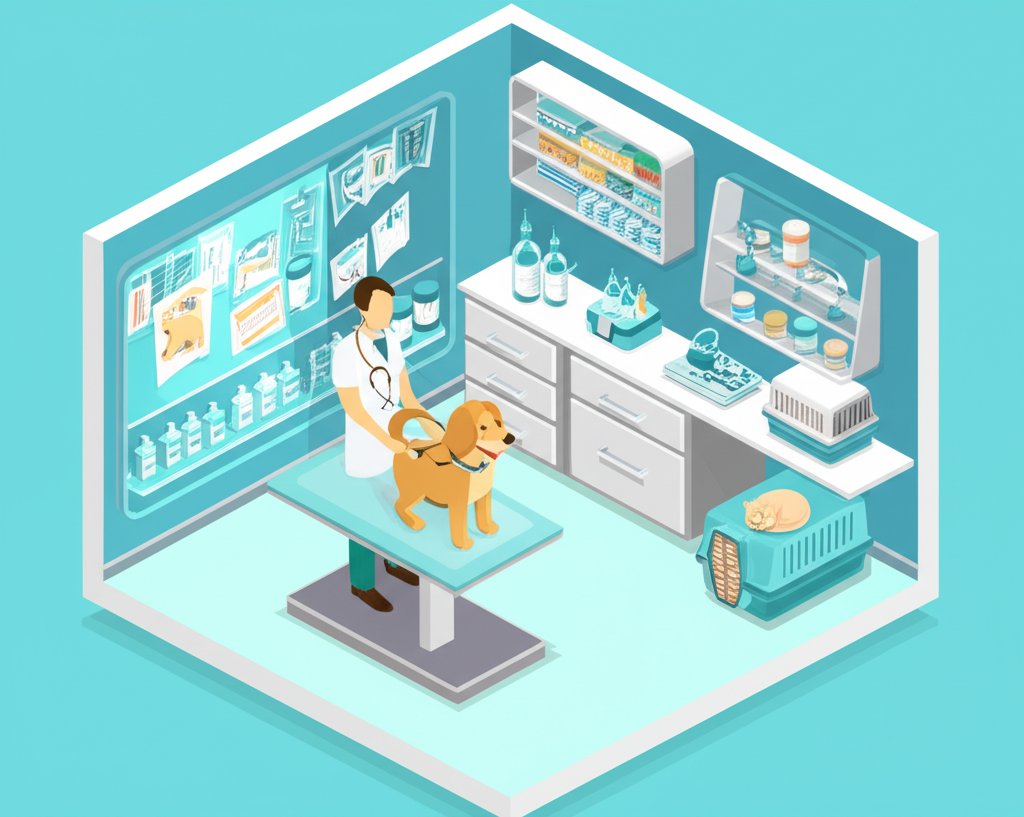The world of animal health is vast and complex, and at its very heart stand veterinarians. Often seen simply as “pet doctors,” these dedicated professionals play a far more expansive and critical role in safeguarding animal well-being and even public health. While many appreciate their compassion, the true depth of their expertise, the rigor of their training, and the breadth of their influence often go unrecognized. This article aims to unveil five essential facts about veterinarians that underscore their profound impact, challenging common perceptions and revealing the multifaceted nature of their vital profession. Prepare to discover why veterinarians are indeed the unsung heroes of our world.
The rigorous training veterinarians undertake, highlighted by years of intensive study, shapes them into the compassionate and skilled professionals needed to provide the best animal health care, and understanding some veterinarian facts can highlight their commitment.
Fact 1: The Unwavering Commitment to Extensive Education and Training
The journey to becoming a veterinarian is one of the most demanding academic paths, rivaling that of human medicine. It requires an extraordinary commitment to science, learning, and hands-on practical experience, ensuring every veterinarian is equipped to handle the diverse challenges of animal health.
From Pre-Vet to DVM: A Decade-Long Journey
Before even applying to veterinary school, aspiring veterinarians typically complete a rigorous four-year undergraduate degree, often in biology, chemistry, or animal science. This pre-veterinary coursework lays a foundational understanding of complex scientific principles. Following this, the Doctor of Veterinary Medicine (DVM or VMD) program itself is another demanding four-year commitment. During these intense years, students delve into subjects ranging from anatomy, physiology, pharmacology, and pathology to microbiology, immunology, and public health. They gain hands-on experience in diagnostic imaging, surgery, internal medicine, and emergency care for a multitude of species. This extensive educational background ensures that every veterinarian possesses a foundational knowledge across many animal taxa, making them uniquely versatile.
Specialization: Mastering Diverse Medical Fields
The DVM degree is just the beginning for many. Like human doctors, veterinarians can pursue further specialization through internships (typically one year) and residencies (typically two to three years). These advanced training programs allow them to become board-certified experts in fields such as internal medicine, surgery, cardiology, oncology, ophthalmology, dermatology, dentistry, and even exotic animal medicine. Each specialization demands thousands of hours of advanced study and clinical practice, culminating in rigorous board examinations. This pursuit of specialized knowledge allows veterinarians to provide the highest level of care for specific conditions or species, constantly pushing the boundaries of animal health and animal well-being through advanced techniques and research.
Fact 2: More Than Just Pet Doctors: The Expansive Scope of Veterinary Practice

The compassion veterinarians show for beloved household pets is undeniable, but their influence extends far beyond the family dog or cat. Their expertise safeguards entire populations, food supplies, and even human health itself.
Protecting Public Health: The “One Health” Connection
One of the most critical, yet often overlooked, facts about veterinarians is their pivotal role in public health. Veterinarians are at the forefront of the “One Health” initiative, recognizing the interconnectedness of human, animal health, and environmental well-being. They monitor and control zoonotic diseases—illnesses transferable between animals and humans, such as rabies, avian influenza, and Lyme disease. By ensuring animal well-being in livestock, poultry, and wildlife, they prevent outbreaks that could devastate both animal populations and human communities. This includes responsibilities in food safety, ensuring that meat, dairy, and other animal products are safe for human consumption, making them essential guardians of public health and global food security.
Caring for All Creatures: Beyond Cats and Dogs
While small animal practice (dogs and cats) remains popular, veterinarians care for an astonishing array of species. Large animal veterinarians work with livestock (cattle, sheep, pigs) critical to agriculture, focusing on herd health, reproduction, and disease prevention to ensure animal well-being and sustainable food production. Exotic animal veterinarians treat everything from birds and reptiles to small mammals like rabbits and ferrets. Others specialize in equine (horse) medicine, zoological medicine (working in zoos and aquariums), or even wildlife rehabilitation, dedicating their careers to preserving biodiversity and the animal well-being of wild populations. This immense diversity in practice areas highlights the adaptability and broad knowledge base required of all veterinarians.
Fact 3: Guardians of Animal Well-being: A Holistic Approach

At the core of the veterinary profession is an unwavering commitment to animal well-being. This isn’t just about treating illness, but encompassing a comprehensive strategy for a high quality of life.
Preventive Care and Quality of Life
A significant portion of a veterinarian’s work focuses on preventative care, which is crucial for long-term animal health. This includes vaccinations, parasite control, nutritional counseling, and regular wellness exams designed to catch potential issues before they become severe. By educating pet owners and livestock producers, veterinarians empower them to make informed decisions that promote their animals’ optimal health and happiness. Beyond physical health, veterinarians also consider an animal’s emotional and behavioral well-being, offering advice on training, enrichment, and stress reduction. They strive to enhance every aspect of an animal’s life, from birth through their senior years, ensuring comfort and dignity.
Pain Management and Ethical Decision-Making
Veterinarians are also experts in pain management, ensuring that animals live free from unnecessary suffering. This involves advanced techniques for acute and chronic pain relief, from medication to physical therapy. Furthermore, veterinarians frequently face complex ethical dilemmas, particularly concerning end-of-life care. They guide owners through difficult decisions with compassion, balancing medical possibilities with the animal’s quality of life and the owner’s wishes. This delicate balance of medical expertise, empathy, and ethical reasoning is one of the most profound facts about veterinarians, demonstrating their deep respect for life and dedication to maintaining animal well-being even in the most challenging circumstances.
Fact 4: A Deep-Rooted Passion Meets Scientific Rigor: The Modern Veterinarian
The image of a veterinarian as someone who simply “loves animals” is true, but it barely scratches the surface. Their profession demands an intricate blend of profound empathy and unwavering scientific precision.
The Growing Female Presence in Veterinary Medicine
A striking demographic shift has occurred within the veterinary profession, with women now comprising a significant majority of practicing veterinarians. Reports indicate that nearly 80% of current veterinary students and a substantial percentage of practicing veterinarians are women. This trend highlights the profession’s appeal to women who are drawn to its unique combination of scientific challenge, compassionate care, and the opportunity to make a tangible difference in animal well-being. This shift has brought diverse perspectives and leadership styles to the field, enriching the veterinary community and continuing to shape its future.
Emotional Resilience and Unconditional Dedication
Being a veterinarian is not just a job; it is a calling that requires immense emotional resilience. Veterinarians regularly face highly stressful situations, from emergency surgeries and critical care to delivering difficult diagnoses and providing euthanasia services. They must maintain composure and deliver precise medical care under pressure, all while supporting distressed animal owners. The long hours, emotional toll, and constant demand for continued education speak to an unconditional dedication to their patients and animal health. This blend of scientific expertise, emotional strength, and genuine passion is what defines modern veterinarians, making them truly remarkable individuals.
Fact 5: Innovations Driving the Future of Animal Health
The field of veterinary medicine is constantly evolving, with groundbreaking innovations regularly transforming animal health and animal well-being. Veterinarians are at the forefront of adopting and developing these advancements.
Advanced Diagnostics and Breakthrough Treatments
Modern veterinarians have access to an impressive array of sophisticated diagnostic tools once exclusive to human medicine. High-resolution digital radiography, ultrasound, MRI, and CT scans allow for precise and non-invasive diagnosis of complex internal conditions. Laboratory diagnostics have advanced dramatically, enabling rapid and accurate identification of diseases. In terms of treatment, innovations like minimally invasive surgery (laparoscopy, endoscopy), laser therapy for pain and healing, stem cell therapy for regenerative medicine, and targeted cancer therapies are now standard practice in specialized veterinary clinics. These technologies not only improve diagnostic accuracy but also lead to more effective treatments, significantly enhancing animal well-being and longevity.
Telemedicine and Accessible Veterinary Care
The digital age has ushered in new ways for veterinarians to provide care, particularly through telemedicine. Virtual consultations allow veterinarians to offer advice, assess minor issues, monitor chronic conditions, and provide crucial follow-up care remotely. This increases accessibility to animal health services, especially for pet owners in rural areas or those with mobility challenges. Beyond individual patient care, big data analytics and artificial intelligence are being utilized to track disease patterns, predict outbreaks, and optimize treatment protocols across large populations, revolutionizing herd health management and public health initiatives. These technological advancements ensure that veterinarians continue to be pioneers in maintaining and improving animal well-being on a broad scale.
Conclusion
The vital role of veterinarians in society is far grander than often perceived. From their extensive and unyielding commitment to education and specialized training to their expansive impact on public health through the “One Health” paradigm, these professionals are truly indispensable. They are the frontline guardians of animal well-being across all species, demonstrating incredible compassion, resilience, and ethical fortitude daily. As the field continues to embrace technological innovation, the future of animal health remains bright, propelled by the tireless dedication of veterinarians. Understanding these essential facts about veterinarians highlights their profound contributions and reminds us of the immense value they bring to both the animal kingdom and human society. The next time you encounter a veterinarian, remember the depth of their knowledge and the breadth of their impact – they deserve our deepest appreciation.
FAQ
What is a veterinarian?
A veterinarian is a doctor of veterinary medicine (DVM or VMD) trained to diagnose, treat, and prevent diseases in animals. Their role extends beyond treating pets to include safeguarding public health, ensuring food safety, and promoting the animal well-being of all species, from livestock to wildlife.
How do veterinarians contribute to public health?
Veterinarians are crucial to public health through the “One Health” concept. They monitor and control zoonotic diseases (transferable between animals and humans), ensure the safety of our food supply (meat, dairy), and play a key role in preventing and managing disease outbreaks that could impact both animal and human populations. They are essential to maintaining global animal health.
What are some common misconceptions about veterinarians?
A common misconception is that veterinarians only treat cats and dogs. In reality, their expertise spans a vast range of animals, including farm animals, exotic species, and wildlife. Another misconception is that their job is “easy” or “just playing with animals,” when in fact it requires extensive, rigorous education, precise medical skills, and significant emotional resilience to manage complex medical cases and difficult client interactions.
How critical is animal well-being to the veterinary profession?
Animal well-being is fundamental to the veterinary profession. Veterinarians are dedicated to ensuring the highest quality of life for animals, focusing not only on treating illnesses but also on preventive care, pain management, nutritional support, and behavioral health. Their goal is to maximize an animal’s physical and emotional health throughout its life.
What is the future of animal health in veterinary medicine?
The future of animal health in veterinary medicine is characterized by rapid innovation. This includes advancements in diagnostic imaging (MRI, CT), breakthrough treatments (stem cell therapy, laser surgery), and the increasing use of telemedicine to improve access to care. Veterinarians are also leveraging data analytics and artificial intelligence to enhance disease prevention and population animal well-being strategies.










